Kia Ceed vs Subaru Forester – Which car suits you better?
Both models have their strengths – but which one suits you more?
Compare performance, efficiency, price and space directly: Kia Ceed or Subaru Forester?
Costs and Efficiency:
Price and efficiency are often the first things buyers look at. Here it becomes clear which model has the long-term edge – whether at the pump, the plug, or in purchase price.
Kia Ceed has a clearly advantage in terms of price – it starts at 23500 £, while the Subaru Forester costs 34700 £. That’s a price difference of around 11228 £.
Fuel consumption also shows a difference: Kia Ceed manages with 6 L and is therefore evident more efficient than the Subaru Forester with 8.10 L. The difference is about 2.10 L per 100 km.
Engine and Performance:
Power, torque and acceleration say a lot about how a car feels on the road. This is where you see which model delivers more driving dynamics.
When it comes to engine power, the Kia Ceed has a minimal edge – offering 140 HP compared to 136 HP. That’s roughly 4 HP more horsepower.
In acceleration from 0 to 100 km/h, the Kia Ceed is clearly perceptible quicker – completing the sprint in 9.50 s, while the Subaru Forester takes 12.20 s. That’s about 2.70 s faster.
In terms of top speed, the Kia Ceed performs barely noticeable better – reaching 197 km/h, while the Subaru Forester tops out at 188 km/h. The difference is around 9 km/h.
There’s also a difference in torque: Kia Ceed pulls evident stronger with 253 Nm compared to 182 Nm. That’s about 71 Nm difference.
Space and Everyday Use:
Cabin size, boot volume and payload all play a role in everyday practicality. Here, comfort and flexibility make the difference.
Both vehicles offer seating for 5 people.
In curb weight, Kia Ceed is noticeable lighter – 1298 kg compared to 1693 kg. The difference is around 395 kg.
In terms of boot space, the Subaru Forester offers distinct more room – 508 L compared to 395 L. That’s a difference of about 113 L.
In maximum load capacity, the Subaru Forester performs noticeable better – up to 1731 L, which is about 440 L more than the Kia Ceed.
When it comes to payload, Subaru Forester hardly perceptible takes the win – 492 kg compared to 490 kg. That’s a difference of about 2 kg.
Who comes out on top?
Overall, the Kia Ceed shows itself to be is largely superior and secures the title of DriveDuel Champion.
It convinces with the more balanced overall package and proves to be the more versatile choice for everyday use.
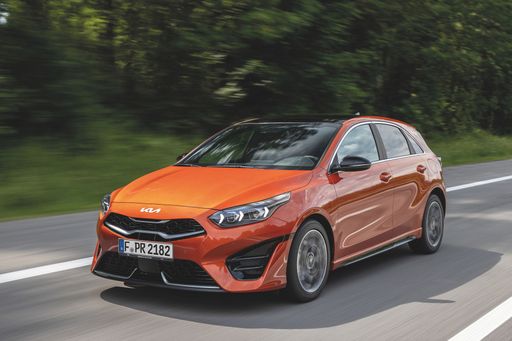
Kia Ceed
Kia Ceed
The Kia Ceed stands out in the compact car segment with its sleek design and impressive handling. It offers a comfortable and well-equipped interior that appeals to both drivers and passengers. With its efficient engine options, the Ceed provides a smooth and enjoyable driving experience suitable for city commutes and longer journeys alike.
details @ press.kia.com
@ press.kia.com
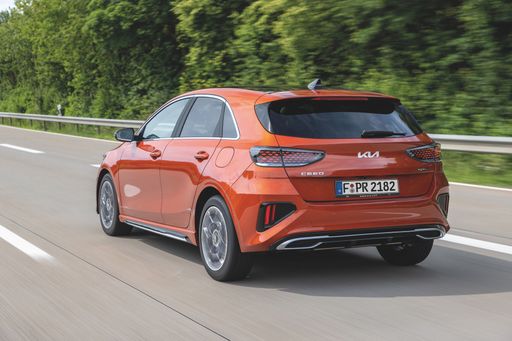 @ press.kia.com
@ press.kia.com
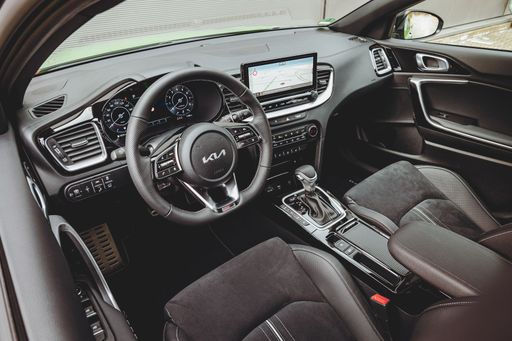 @ press.kia.com
@ press.kia.com
Subaru Forester
The Subaru Forester is a versatile SUV known for its impressive off-road capabilities and practical design. With a spacious interior and advanced safety features, it offers comfort and security for both city driving and outdoor adventures. Its reliable performance and all-wheel-drive system make it a popular choice among those who appreciate a combination of functionality and rugged charm.
details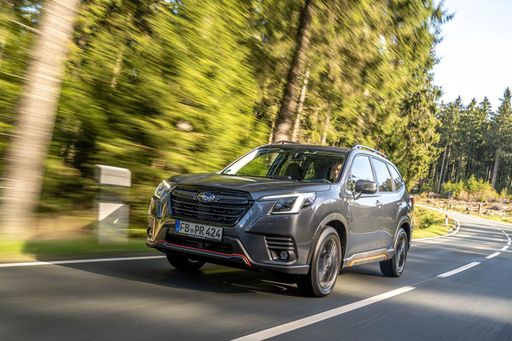 @ Subaru
@ Subaru
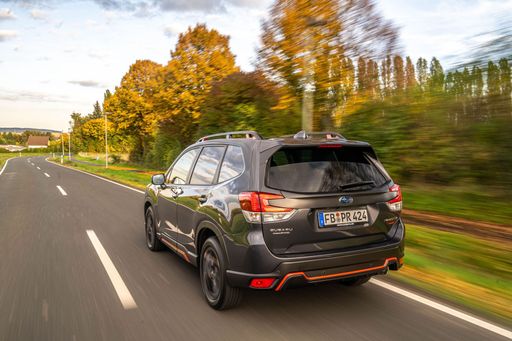 @ Subaru
@ Subaru
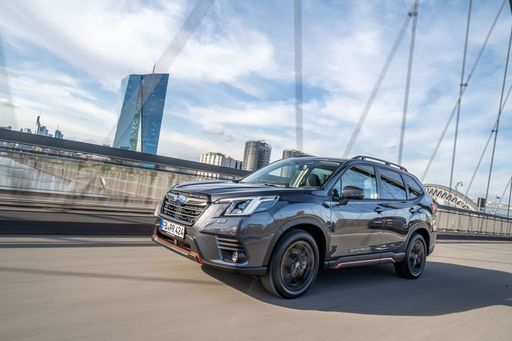 @ Subaru
@ Subaru
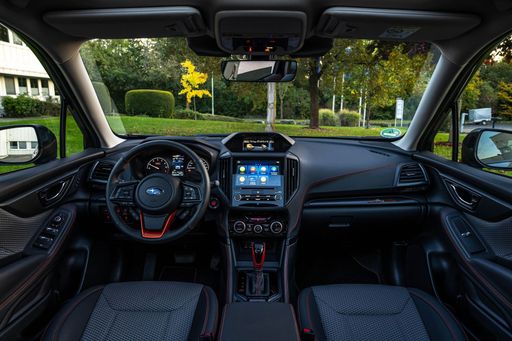 @ Subaru
@ Subaru
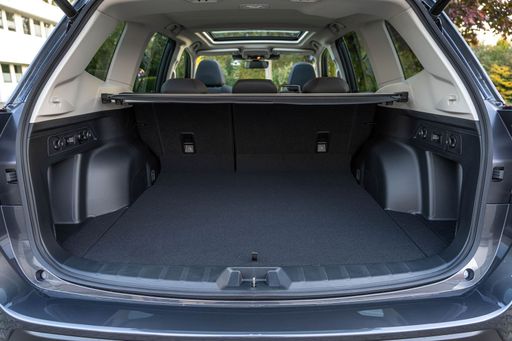 @ Subaru
@ Subaru

|

|
|
|
|
Costs and Consumption |
|
|---|---|
|
Price
23500 - 26300 £
|
Price
34700 - 42200 £
|
|
Consumption L/100km
6 - 6.4 L
|
Consumption L/100km
8.10 L
|
|
Consumption kWh/100km
-
|
Consumption kWh/100km
-
|
|
Electric Range
-
|
Electric Range
-
|
|
Battery Capacity
-
|
Battery Capacity
-
|
|
co2
137 - 146 g/km
|
co2
183 g/km
|
|
Fuel tank capacity
50 L
|
Fuel tank capacity
48 L
|
Dimensions and Body |
|
|---|---|
|
Body Type
Hatchback
|
Body Type
SUV
|
|
Seats
5
|
Seats
5
|
|
Doors
5
|
Doors
5
|
|
Curb weight
1298 - 1372 kg
|
Curb weight
1693 - 1739 kg
|
|
Trunk capacity
357 - 395 L
|
Trunk capacity
508 L
|
|
Length
4315 mm
|
Length
4670 mm
|
|
Width
1800 mm
|
Width
1830 mm
|
|
Height
1447 mm
|
Height
1730 mm
|
|
Max trunk capacity
1253 - 1291 L
|
Max trunk capacity
1679 - 1731 L
|
|
Payload
478 - 490 kg
|
Payload
446 - 492 kg
|
Engine and Performance |
|
|---|---|
|
Engine Type
Petrol, Petrol MHEV
|
Engine Type
Petrol MHEV
|
|
Transmission
Manuel, Automatic
|
Transmission
Automatic
|
|
Transmission Detail
Manual Gearbox, Dual-Clutch Automatic
|
Transmission Detail
CVT
|
|
Drive Type
Front-Wheel Drive
|
Drive Type
All-Wheel Drive
|
|
Power HP
100 - 140 HP
|
Power HP
136 HP
|
|
Acceleration 0-100km/h
9.5 - 13.2 s
|
Acceleration 0-100km/h
12.20 s
|
|
Max Speed
178 - 197 km/h
|
Max Speed
188 km/h
|
|
Torque
172 - 253 Nm
|
Torque
182 Nm
|
|
Number of Cylinders
3 - 4
|
Number of Cylinders
4
|
|
Power kW
74 - 103 kW
|
Power kW
100 kW
|
|
Engine capacity
998 - 1482 cm3
|
Engine capacity
1995 cm3
|
General |
|
|---|---|
|
Model Year
2024
|
Model Year
2025
|
|
CO2 Efficiency Class
E
|
CO2 Efficiency Class
G
|
|
Brand
Kia
|
Brand
Subaru
|
What drivetrain options does the Kia Ceed have?
The Kia Ceed is available as Front-Wheel Drive.
The prices and data displayed are estimates based on German list prices and may vary by country. This information is not legally binding.
